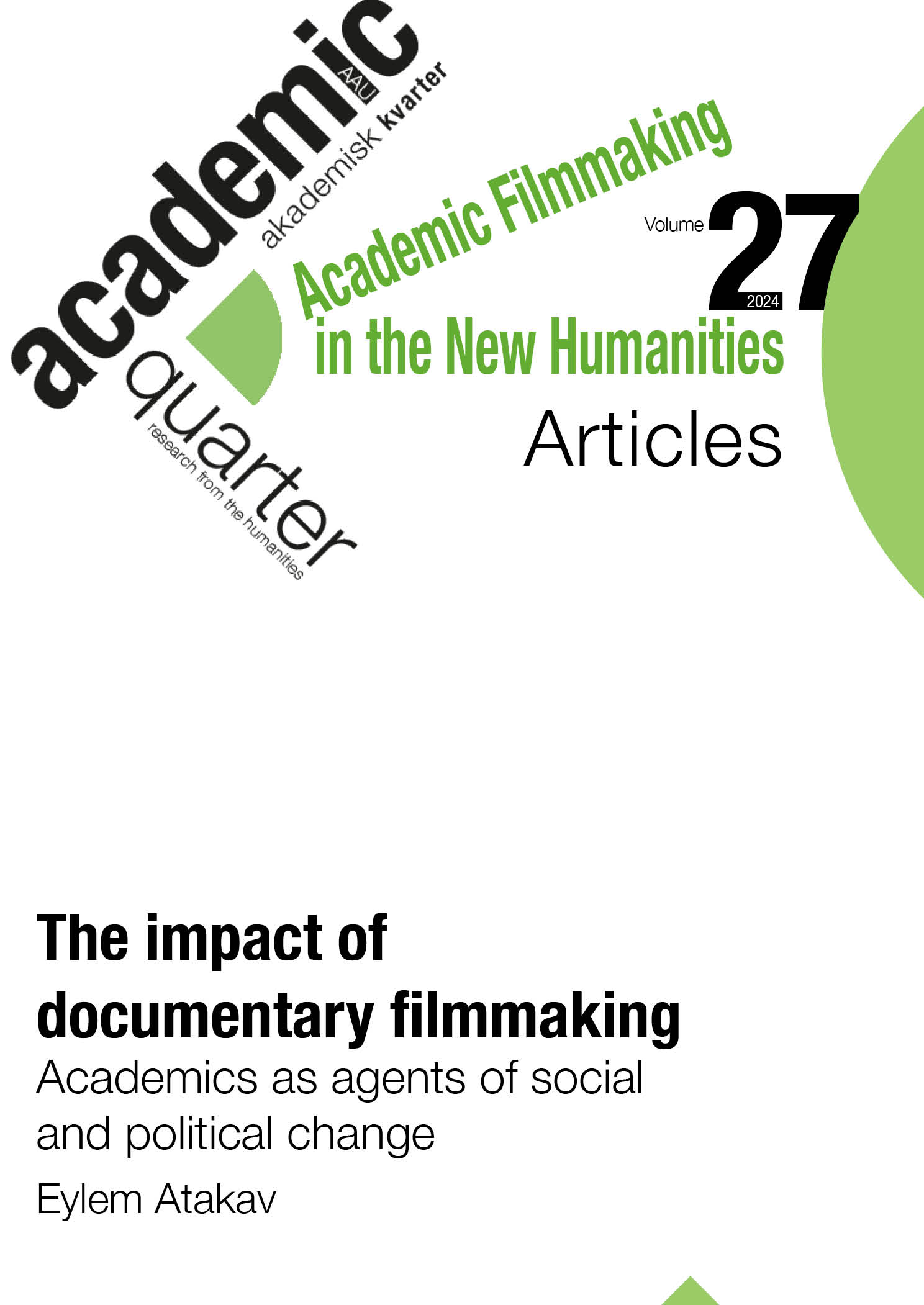Abstract | Abstract
In this article, I draw on three documentaries I have made (Growing Up Married [2016], Lifeline [2020], and Left Behind [2023]) on different forms of gendered violence. I use these as examples to discuss ways in which films made within academic contexts can inform and influence policy. While doing so I reflect on how I built a network of policy makers and charities and used film as a potentially useful tool for partnership development. I explore how scholars can consider filmmaking as a form of activism while arguing that strategies developed within the frame of creative practice afford us alternative ways of promoting social, cultural and political change. I examine the relationship between academic research and activism and the specific role that filmmaking can play in enhancing/problematising this relationship, and argue that the cultivation of impact (as activism) goes beyond institutional, and funding imperatives.
Referencer
Atakav, Eylem. 2020. “Growing Up Married: representing forced marriage on screen.” Critical Discourse Studies 17 (2): 229-241. https://doi.org/10.1080/17405904.2019.1665078
Atakav, Eylem, dir. 2016. Growing Up Married. United Kingdom: University of East Anglia. https://vimeo.com/179433103/fdb4483673?share=copy
Atakav, Eylem, and Karoline Pelikan, dir. 2020. Lifeline. United Kingdom: University of East Anglia. https://vimeo.com/481664305
Atakav, Eylem, and Karoline Pelikan, dir. 2023. Left Behind. United Kingdom: University of East Anglia. https://vimeo.com/837614493
Bacha, Julia. 2015. “Why documentaries still have the power to change the world.” World Economic Forum on Latin America. Published May 7, 2015. https://www.weforum.org/agenda/2015/05/why-documentaries-still-have-the-power-to-change-the-world/
Fitzgerald, Angela, and Magnolia Lowe. 2020. “Acknowledging Documentary Filmmaking as not Only an Output but a Research Process: A Case for Quality Research Practice.” International Journal of Qualitative Methods, 19: 1-7. https://doi.org/10.1177/1609406920957462
Gordon, Rebecca. 2019. “‘Why would I want to be anonymous?’ Questioning ethical principles of anonymity in cross-cultural feminist research.” Gender and Development 27 (3): 541-554. https://doi.org/10.1080/13552074.2019.1664044
Kelly, Anthony. 2014. “The impact of impact on the REF.” theconversation.com. Published November 14, 2014. Last accessed February 15, 2024. https://theconversation.com/the-impact-of-impact-on-the-ref-35636
Kerrigan, Susan, and Joanna Callaghan. 2018. “The impact of filmmaking research.” Media Practice and Education 19 (3): 229-242. https://doi.org/10.1080/25741136.2018.1472466
Mateer, John, and Samm Haillay. 2019. “Digital Disruption and its implications in generating ‘impact’ through film and television Practice-as-Research.” Media Practice and Education 20 (2): 165-178. https://doi.org/10.1080/25741136.2019.1605674
Morgan, Rachel, Annilee Game, and Natasha Slutskaya. 2018. “Qualitative research through documentary filmmaking: Questions and possibilities.” In The SAGE Handbook of Qualitative Business Research Methods: Methods and Challenges, edited by Catherine Cassell, Ann Cunliffe, and Gina Grandy, 329-344. London: Sage Publications. https://doi.org/10.4135/9781526430236.n20
Ramasubramanian Srividya, and Alexandra N. Sousa. 2021. “Communication scholar-activism: conceptualizing key dimensions and practices based on interviews with scholar-activists.” Journal of Applied Communication Research 49 (5): 477-496. https://doi.org/10.1080/00909882.2021.1964573
Redmon, David. 2019. Video Ethnography: Theory, Methods, and Ethics. London: Routledge. https://doi.org/10.4324/9780429056321
UKRI, UK Research and Innovation. n.d. “How Research England supports research excellence” (REF Impact). ukri.org. Accessed on 3rd March 2024. https://www.ukri.org/who-we-are/research-england/research-excellence/ref-impact/

Dette værk er under følgende licens Creative Commons Navngivelse – Ikke-kommerciel – Ingen Bearbejdede Værker (by-nc-nd).
Copyright (c) 2024 Eylem Atakav
